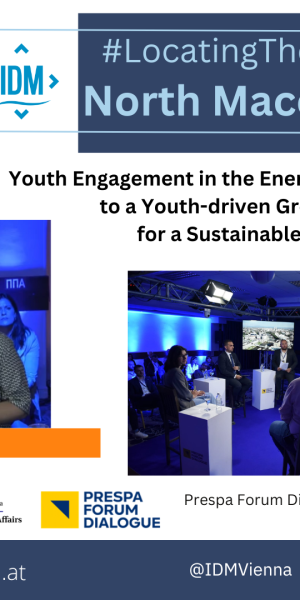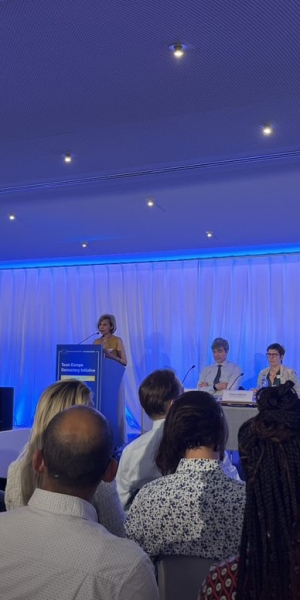This year, we met for a special Danube Salon on the boat MS Dürnstein, during the Europa-Forum Wachau (EFW), on Friday 23 June 2023. This year’s topic was “A New Compass – Which Direction will Europe’s Security take?” moderated by Sebastian Schäffer, Director of the Institute for the Danube Region and Central Europe (IDM). He was joined by numerous esteemed guests to debate Europe’s ambitious defense strategy.
Ambassador Martin Eichtinger, President of the Europa-Forum Wachau, opened the salon with a meaningful speech, expressing gratitude for the innovative approach of the EFW. He also highlighted Austria’s forthcoming chairmanship of the European Union strategy for the Danube Region (EUSDR) and conveyed enthusiasm for the opportunities it will bring.
The first-round table talk gathered Karoline Edtstadler, Federal Minister for the EU and Constitution, Austria, Peter Burke, Minister of State for European Affairs and Defence, Ireland, and Tytti Tuppurainen, Former Minister for European Affairs, Finland.
Edstadler discussed Austria’s role in the Security Compass framework, advocating for European peace and security architecture despite Austria’s neutral status. She expressed concerns about the Strategic Compass’s timing following the Russian annexation of Crimea, and highlighted Austria’s support for Ukraine through political, financial, and humanitarian aid. While Austria remains neutral on providing military support, it actively engages in security and defense discussions, contributing to the EU’s battle groups. The minister emphasized the importance of unity in facing challenges and defending European values and affirmed Austria’s active involvement in various aspects of the Strategic Compass to support Ukraine.
Tuppurainen addressed Finland’s heightened security perception after joining NATO and its support for strengthening the EU’s security architecture through the Strategic Compass. She emphasized the increased cyberattacks on Finland post-NATO membership and the need for additional measures if the Strategic Compass proves inadequate. The war in Ukraine has unintended consequences for Russia, with Finland joining NATO and Sweden expected to follow. The former minister stressed the significance of continuous evaluation, preparedness, and investments in the hybrid toolbox, along with tryouts and training to counter security threats effectively.
Burke reaffirmed Ireland’s commitment to maintaining military neutrality, aligning with Austria’s stance. He emphasized Ireland’s proactive role in evaluating the Security Compass and contributing to the EU’s Defense architecture, with a particular focus on cyber security and civilian crisis management. From a Western European perspective, the speaker discussed key security challenges that the EU should prioritize, stressing the importance of investing in defense industries and capabilities to enhance security assets. While supporting Ukraine, Ireland also underscored the need to safeguard the EU’s own security. The Strategic Compass was highlighted as a crucial tool to address modern threats like hybrid threats and cyber security, while other initiatives were seen as opportunities to foster a more inclusive and united Europe, working together to uphold shared values effectively.
Colin Scicluna, Head of Cabinet of European Commission Vice-President for Democracy and Demography Dubravka Šuica, emphasized the vital role of European Union’s unity and determination, particularly in times of crisis. He dispelled the misconception that neutrality implies indifference and highlighted the EU’s collective ability to achieve important objectives. Additionally, Scicluna underscored the significance of bolstering democratic resilience and fostering an environment where European citizens actively engage and contribute to the democratic process.
Halfway through the event, the MS Dürnstein stopped in Weißenkirchen in der Wachau to let our keynotes speakers off the boat and delved into the second round-table discussion with Lukas Mandl, Austrian Member of the European Parliament, Alena Kudzko, Vice President for Policy and Programming at GLOBSEC, and Elisabeth Braw, Senior Fellow at American Enterprise Institute. Sebastian Schäffer went on with specific questions about the Strategic Compass aimed at the European approach.
Alena Kudzko addressed the EU’s migration policies in relation to the Russian War in Ukraine and the Strategic Compass’s role in tackling EU defense challenges. She also explored the implications of the Strategic Compass for civilians and EU citizens. The discussion emphasized the necessity of reevaluating migration policies in Europe due to the war’s influence on migration flows. While efforts are underway to reform the European asylum system, there is recognition for the need to consider different approaches to migrants from various countries.
Elizabeth Braw discussed the importance of the Black Sea Grain Deal for global food security and emphasized the need for enhanced security in the Black Sea region. She also highlighted the crucial role of the private sector in shaping the future of Moldova and Ukraine within the European Union, stressing its significance for economic growth and investment. Despite challenges, the speaker expressed optimism, citing public support for Ukraine and understanding of the conflict with Russia. The successful negotiation and cooperation in the Black Sea grain deal were praised, but potential risks and challenges in global supply chains were acknowledged, requiring capabilities beyond monitoring to address effectively.
Lukas Mandl, Vice-Chair of the Subcommittee on Security and Defence in the European Parliament, discussed the challenges of aligning diverse perceptions of security threats among member states and political parties within the Security Compass framework. He explored the EP’s potential role as a security actor and its cooperation with the European Council. Cyber threats were acknowledged as critical, and the budget allocation and financing of the Strategic Compass were examined. Mandl reflected on progress in defense budgets and the Strategic Compass’s development, stressing the importance of a robust transatlantic relationship and strategic autonomy. He also emphasized the need to reevaluate migration policies in Europe, recognizing migration as a continuous phenomenon and ongoing efforts to reform the asylum system. Notably, Mandl viewed autonomy as complementary to NATO’s objectives.
As our journey drew to a close, Sebastian Schäffer invited a final guest on stage, Ambassador Harald Stranzl, to round off the discussions. He discussed the main priorities of the EU Strategy for the Danube Region (EUSDR) during Austria’s upcoming presidency. These priorities include security, stability, a European perspective for the Danube countries, innovation, skills, and business opportunities in the region. The Austrian presidency aims to address challenges such as geopolitical shifts, climate change, and the Russian war in Ukraine. Additionally, the focus will be on sustainable tourism, ecosystem protection, and involving civil society and youth in decision-making processes. Collaboration with Ukraine is also emphasized for capacity building and impactful projects.
In his closing remarks, Sebastian Schäffer emphasized the profound importance of the Danube Salon over the past years despite the challenges posed by the pandemic and overshadowing war. He expressed gratitude to the EFW team, the cooperation partners and esteemed guests who made the event possible. Schäffer acknowledged the significance of the Strategic Compass and extended three wishes: for the war to end, for Ukraine to achieve freedom, and for us to remain steadfast in upholding our moral compass. He also recognized and thanked his team for their invaluable contributions, enabling the success of the event. Schäffer concluded by warmly inviting everyone to enjoy the rest of the journey.
“After the fall of the Iron Curtain, the regions along the Danube moved closer together. It’s a very lively and active cooperation, supported by many institutions, such as the IDM, among others.”
– Ambassador Martin Eichtinger
“I can only reiterate what I’m saying, Austria has a really strong stance on how we reacted to the war of aggression of Russia towards Ukraine. We are not neutral in the political sense.”
– Karoline Edtstadler, Federal Minister for the EU and Constitution.
“We [Finland] find it immoral to stay neutral and non-aligned in a situation where Ukraine is fighting for their lives, for our values, our freedom, our democracy, our way of life. These values are enshrined in the European Union Treaties”
– Tytti Tuppurainen, Former Minister for European Affairs.
“Our public infrastructure is ever-changing and over the next decade in our country it’s going to change vastly as we really try and harness the huge amount of offshore renewable energy.”
– Peter Burke, Minister of State for European Affairs and Defence.
“It is very important to create a situation where European citizens can not only feel a part of their democracy but also that they can actually contribute to the strengthening of it.”
– Colin Scicluna, Head of Cabinet of European Commission Vice-President for Democracy and Demography Dubravka Šuica.
“It’s amazing what Ukraine and Moldova managed to achieve given the very difficult circumstances they are in. As long as this trajectory continues, I do think that the solidarity in the EU will continue”
– Alena Kudzko, Vice President for Policy and Programming at GLOBSEC
“I hope this war has been a useful reminder to all of us of the enormous logistics that goes into agriculture, into growing the food we eat, transporting it to where it needs to be and what happens if it doesn’t reach us, which is why the Grain Deal is so important.”
– Elisabeth Braw, Senior Fellow at American Enterprise Institute.
“I’m confident, maybe more confident than before this fully fledged military war, that things can work out well because it’s true that nowhere in the European Union and the world, it was expected that Europe could act as unified as it actually has been acting since February 24 last year.”
– Lukas Mandl, Austrian Member of the European Parliament.
“It’s really striking how much the world, Europe and also the Danube Region have changed since the first Austrian presidency of the EUSDR in 2010”
– Ambassador Harald Stranzl
Written by: Lucas Décorne











